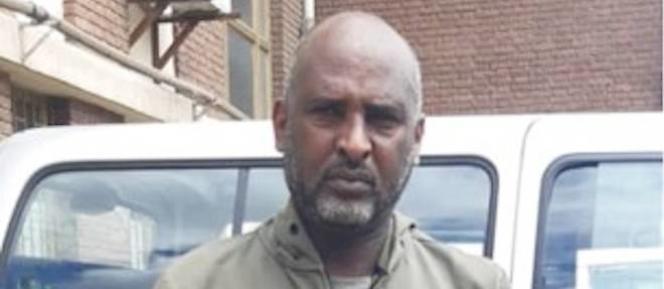(MENAFN- SomTribune) After escaping from an Ethiopian court in 2021, 39-year-old Kidane Zekarias Habtemariam, whose network stretched from Somalia to Libya, was finally arrested
For East African migrants, the beginning of the year brought a rare piece of good news: The notorious Eritrean smuggler Kidane Zekarias Habtemariam was arrested on January 5 in Khartoum, Sudan, in an international police operation led by the United Arab Emirates with Interpol. The man is“one of the cruelest smugglers in the world,” according to police in the Netherlands, where he was on the country's most-wanted list.
Within his vast network, which stretched from Somalia to Libya and oversaw the passage of thousands of young Ethiopians, Eritreans and Somalis to Europe each year,“Kidane” made life hell for those seeking exile: torturing, raping and brutalizing young migrants to extort money from them.“He is a demon,” said Meron Estefanos, an Eritrean migrant rights advocate.
Kidane was recognized in the streets of Addis Ababa by a migrant he had personally tortured and was first arrested in Ethiopia in 2020. Prosecuted for human trafficking, he managed to escape from the federal court in Addis Ababa a year later. With the help of police officers, he changed his clothes in the court's toilets before leaving the building incognito. Months later, Ethiopia sentenced him in absentia to life in prison.
Exorbitant ransoms
For the past two years, although on the run, the smuggler has continued his trafficking on the smuggling routes that link the Sudanese and Libyan deserts relatively undisturbed.“He spent the smuggling season, from April to September, in Libya,” explained Meron Estefanos.“The rest of the time he was doing business in the United Arab Emirates,” where he was a resident.
Kidane Zekarias Habtemariam, 39, was the subject of two Interpol red notices – the highest priority of international police. In his widespread racketeering network, he used the Emirates as a hub, charging exorbitant ransoms to the families of migrants into a local bank account. He is being prosecuted in the UAE for embezzlement.
The Netherlands, for its part, has requested his extradition on charges of human trafficking from Africa to Europe.“His arrest is a great victory for Dutch and international justice, the kind of breakthrough we've been waiting for years,” said an anonymous member of the Dutch Attorney General's office, which is currently deciding the case of one of his associates. The trial of“Welid” (real name Tewelde Goitom), another Eritrean smuggler, has just begun in the court of Zwolle, a city 80 km east of Amsterdam. The man is being prosecuted for participation in a criminal organization, human trafficking, hostage-taking, extortion and violence, including sexual violence.
The two men have long maintained a reign of terror in the Libyan desert. At their base in Bani Walid, south of Misrata, Welid and Kidane locked up migrants with the promise of a Mediterranean crossing in order to extort their families.“Kidane was in charge of a camp in Libya where thousands of migrants pass through. Many do not survive,” said Dutch police. An epicenter of migrant trafficking in recent years, the Bani Walid camp has sometimes been dubbed“the ghost town” because of the number of would-be exiles who have died there at the hands of human smugglers.
Selam* spent two years there, in 2017 and 2018.“A hell on earth,” she confided by phone from the United States, where she obtained refugee status. At the time, the 15-year-old wanted to escape military service, which is mandatory in Eritrea. In Asmara, her family paid $6,000 in exchange for the promise to reach the Sicilian coast. But once in Libya, young Selam's path crossed that of Kidane, her future torturer, who asked her relatives for an additional $7,000 for the crossing.“I told him I couldn't pay, that my mother was dead, that all the family's money had gone into the funeral and he replied: 'If you don't give the money, you'll join her soon,'” she remembered.
'A hyena excited by the sight of blood'
Kidane's sex slave for six months, Selam is still undergoing reconstructive surgery in the United States.“He raped us daily, tortured us and systematically put out his cigarettes on our skin.” The man showed limitless cruelty, filming the torture on his phone to better scare the families into ransom.“He is an animal, a hyena excited by the sight of blood,” said Selam.
This kind of human trade from the Horn of Africa was the subject of a documentary, Voyage en barbarie (Under the Skin: A Journey Into Savagery, winner of the 2015 Albert Londres Prize), describing the ordeal of young would-be exiles at the hands of smugglers willing to do anything to hold them for ransom. Kidane, Welid and the Eritrean smuggling network took advantage of the collapse of post-Gaddafi Libya to establish their platform there.
“There are now 20 detention centers, official and unofficial, and secret prison networks that are reportedly controlled by armed militias,” said Mohamed Auajjar, rapporteur from the UN Human Rights Council fact-finding mission to Libya. Last year, Medecins Sans Frontieres (MSF) estimated the number of migrants stranded in Libya at 600,000. Tens of thousands of them come from the Horn of Africa, where they are trying to escape military service in Eritrea or the threat of the Shabab jihadists in Somalia.
“These two arrests send a strong signal to men who thought they were untouchable,” said Meron Estefanos, hoping that they will put a“stop” to human trafficking from Eritrea. In Libya, on the other hand, trafficking is benefiting from the windfall created by the civil war. Since last year, new migration routes have opened up in Cyrenaica in eastern Libya.
By
Le Monde



















Comments
No comment